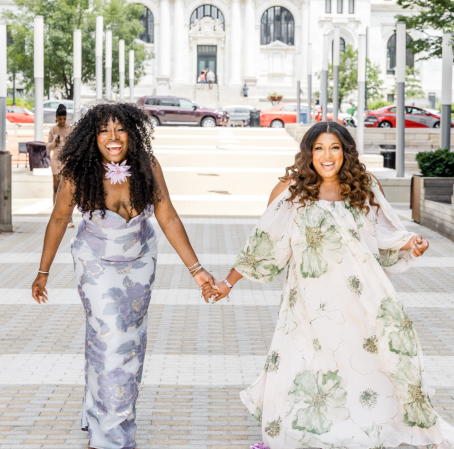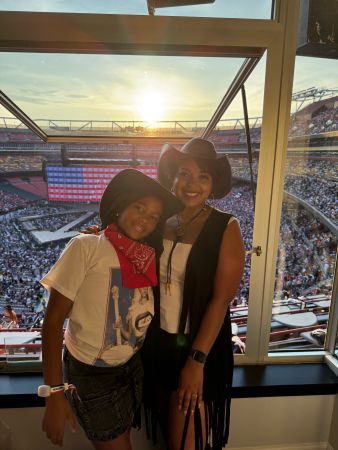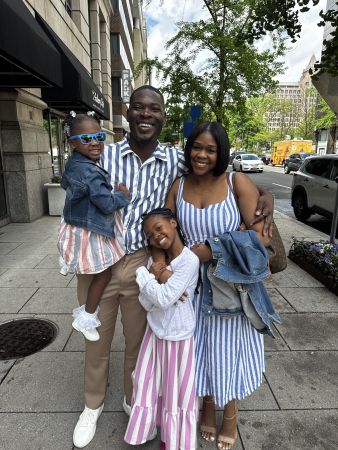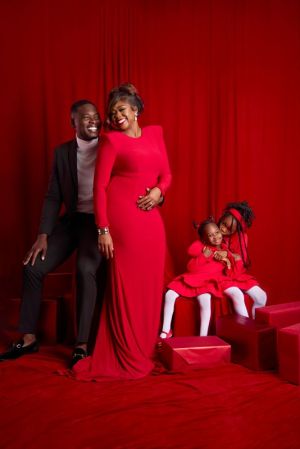Black Kids Deserve Joy Without Conditions [Op-Ed]
Abundance Is Our Birthright: Black Children Shouldn’t Have To Earn Their Joy [Op-Ed]
Share the post
Share this link via
Or copy link

Every season of childhood joy comes with a side of policing when it comes to Black kids. In the summer, families post photos from cruises or expensive theme park trips, and instead of celebrating, people jump to judgment—as if leisure and learning can’t exist in the same household.
By back-to-school season, the pattern continues. A boy shows up with a Sprayground bookbag or fresh sneakers, and the whispers begin: “Does he even care about his grades?” The assumption is that style cancels out focus, that abundance automatically erases discipline.
Come Christmas, little girls in holiday dresses or pajamas post videos singing or doing a viral dance, and almost on cue, the comments flood in: “I hope she knows her ABCs.”
Love MadameNoire? Get more! Join the MadameNoire Newsletter
We care about your data. See our privacy policy.
And it won’t stop there. Soon it will be prom season, then graduation, and the same tired script will play out again. Every milestone, every celebration, every expression of joy becomes an opportunity for people to question whether Black children have “earned” it.
What these critiques reveal is not genuine concern but a cultural reflex—one that assumes the Venn diagram of joy, abundance, and underachievement is always overlapping when it comes to Black kids. It’s a script designed to shrink them before they even get the chance to shine.
This isn’t just harmless commentary. It’s a cultural script designed to shrink Black children before they even get the chance to shine. Other children are free to exist in softness and play without explanation. Ours are told they must overperform—straight-A students, perfectly behaved, endlessly resilient—before they can deserve what should be the birthright of all children: joy, leisure, style, and freedom.
As Black women—mothers, aunties, teachers, caregivers—we know how damaging that script is. We also know it’s not new. Many of us were raised with the “twice as good” standard, told that survival and sacrifice were the only ways to prepare for the world. However, survival isn’t the ceiling we’re passing down. Today’s Black millennial moms are pushing back, raising children who are grounded and abundant, teaching that joy is not conditional but necessary.
While this pattern plays out everywhere, it takes on a particularly resonant quality in the D.C.metropolitan area—the DMV—where Black abundance, power, and culture have been shaping generations.
RELATED CONTENT: The Women Behind District Motherhued Join ‘Mompreneurs’ To Tell Their Story
The DMV as a Hub for Black Abundance and Grounding
The DMV is where the nation’s capital meets Maryland suburbs and Northern Virginia neighborhoods, tied together by shared transit lines, work commutes, and overlapping cultural identities.
The DMV is also home to some of the most affluent and culturally rooted communities in the country. Charles County, Maryland is currently the wealthiest majority-Black county in the nation, just a stone’s throw from its predecessor, Prince George’s County. They’re joined by Howard County, which has the highest median household income in Maryland and was ranked the sixth-wealthiest county in the nation in early 2025, according to U.S. News & World Report.
In this region, Black abundance is visible—and so are the tensions it brings. Parents who are part of this demographic can find themselves navigating questions about how to raise children with access to the finer things while keeping them grounded, grateful, and resilient. Is privilege a risk? Does it breed entitlement, or is it a necessary corrective to generations of deprivation and struggle?

Founded in 2016 by Simona Noce Wright and Nikki Osei-Barrett, District Motherhued has grown from a gathering of 25 women into a community of more than 45,000 Black mothers nationwide. Their flagship event, The Momference, is the first national conference created specifically for millennial moms of color. Their NICU Kit Program and award-winning 4th Trimester initiative have provided hands-on support to thousands of families. In 2021, they launched the District Motherhued Society (DMS)—a membership-based platform for mothers deeply committed to supporting one another in wellness, philanthropy, financial growth, and healthy parenting strategies.
DMS is where these conversations about joy, privilege, and grounding unfold daily. Three mothers from this community—Latisha M. Roberson-Marke, Noémie V. Gaines, and Lauren Anderson—shared with MadameNoire exactly how they are raising their children in abundance without apology.
“Bougie Doesn’t Mean Unprepared”
For Latisha M. Roberson-Marke, raising her 11-year-old daughter Sydney means coupling access with responsibility.
“Money doesn’t grow on trees,” “Treat others how you want to be treated,” “There’s always someone less fortunate”—these sayings from my childhood guide me now as a parent,” she says. “With Sydney, I keep her grounded by making sure she earns some of the finer things through chores, good grades, and kindness. We also volunteer, donate, and stay active in our community, so she sees firsthand the importance of giving back.”

In her home, privilege is framed as a blessing, not a guarantee. “If I’m traveling to Paris, she’s coming to Paris. If I’m flying first class, she’s sitting right beside me. Balance is about exposure and inclusion—making her feel that these experiences are normal while also teaching her not to take them for granted.”
Latisha doesn’t accept the idea that raising “bougie” kids makes them naive. “This is her reality, and I hope it continues to be. Yes, she’s exposed to beautiful experiences and nice things, but that doesn’t mean she isn’t being prepared for the world. She’s kind, respectful, smart, talented, and supported by a strong village. Bougie doesn’t mean unprepared.”
Her hope for Sydney’s adulthood is clear: “I want her to grow up knowing she is deeply loved, worthy of the best, and capable of standing firm in her values. If she walks into adulthood with gratitude, confidence, and compassion, then I’ve done my job.”
What Latisha reveals is how shallow the critiques of “bougie Black kids” really are. Critics act as though luxury erases lessons, when in fact, abundance can deepen them. Sydney is learning that joy comes with gratitude and responsibility. Black children don’t need deprivation to be strong. They can learn resilience right alongside joy.

“Our Children Deserve Softness and Joy”
Noémie V. Gaines believes that the policing of Black joy stems from a deeper refusal to see Black children as deserving of softness. She rejects it outright.
“Our children deserve safety, softness, and joy just as much as anyone else,” she says. “I don’t think giving them this lifestyle makes them naive. Instead, it gives them a foundation of security and confidence. As long as they’re rooted in identity, compassion, and resilience, they’ll be more than ready for the world’s realities.”

For her, balance is not about restriction—it’s about rhythm. “Some seasons call for more exposure, like leaning into travel or enrichment opportunities. Others call for slowing down, building routines, or deepening our connection to community. The goal isn’t perfection—it’s alignment.”
In her household, gratitude is daily and deliberate. “We practice it out loud. Nightly reflections, thank-you notes, pausing to name the people who make our lives possible. We also involve them in community service because generosity and responsibility aren’t abstract—they’re lived.”
She hopes her daughters carry forward identity, not materialism. “I want them to know their worth isn’t tied to what they have, but to who they are—deeply loved and resilient humans capable of creating impact wherever they go.”

Noémie’s words cut to the heart of the issue. When people question whether Black children “deserve” abundance, what they’re really saying is they don’t believe our kids deserve softness. However, resilience doesn’t only come from hardship. It can also grow from being rooted in love, safety, and identity. Joy is not an indulgence for Black children. It’s a right.
RELATED CONTENT: You Got This! The Back-To-School Commandments For A Middle Schooler
“Preparation Doesn’t Only Come From Hardship”
In Prince George’s County, Lauren Anderson is raising her daughters in one of the country’s most visible hubs of Black affluence. Her approach shows how privilege and perspective can work hand in hand.

“My girls are growing up in a gated community, attend private school, worship locally, vacation, and engage in extracurriculars where they are constantly surrounded by people who look like them. While I’m grateful for these affirming spaces, I know it’s equally important they remain rooted in values like gratitude, humility, and resilience.”
That grounding begins with faith and storytelling. “We share our own stories and those of our ancestors so my daughters understand their life is not accidental but the result of resilience and sacrifice.”
Lauren challenges the belief that only struggle builds character. “Preparation doesn’t only come from hardship. It comes from strong values, clear identity, faith, and the ability to adapt. Our children deserve joy, abundance, and access just as much as anyone else.”
She also builds resilience by setting limits. “In a world where they experience a lot of yes, we tell our daughters no so they can learn disappointment and adaptability.”
Her ultimate hope: “The greatest legacy we leave is not material wealth, but values—gratitude, faith, resilience, compassion, and love.”
Lauren’s perspective pushes back on one of the most harmful myths in our community—that authenticity requires suffering. To say Black children must struggle to be prepared is to repeat the same logic this country has used to deny them joy. Preparation doesn’t just come from pain. It comes from values, identity, and love.
Protecting the Right to Joy
What Latisha, Noémie, and Lauren show us is that Black millennial mothers are already rejecting the false choice between raising grounded kids and raising abundant ones. They’re doing the layered, intentional work of raising children who know joy and resilience, gratitude and abundance, as well as privilege and perspective.
The policing of Black children’s joy is nothing more than an extension of respectability politics—an expectation that our kids must be perfect to be worthy. However, Black children don’t owe respectability to deserve joy. Their laughter, their leisure, their luxury are not conditions to be met, but rights to be protected.
As Black women—mothers, aunties, teachers, caregivers—we have a collective charge to defend the joy of our babies at every turn. We have to teach our children that abundance is a birthright. For Black children, joy is preparation. Joy is resilience. Joy is freedom.
RELATED CONTENT: The Whitewashing Of Black History Is Happening In Real Time — And We Can’t Wait For Schools To Fix It [Op-Ed]







